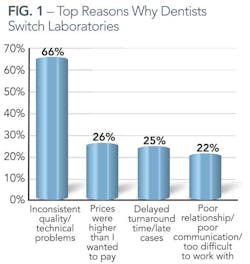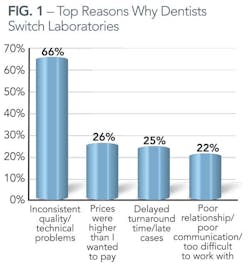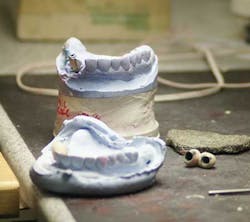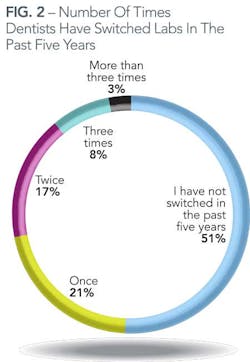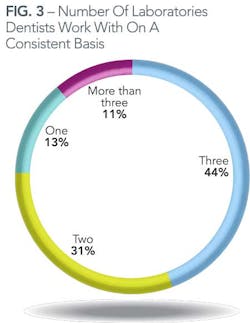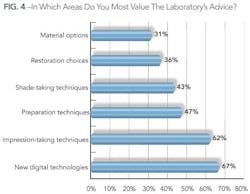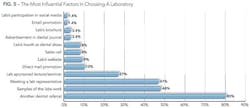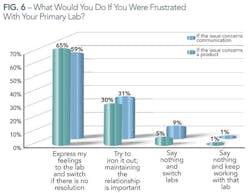Why Dentists Are Changing Laboratories
April 2013
In the last five years, nearly 50% of dentists have changed laboratories because of an unsatisfactory performance or relationship. We'll discuss the particular reasons for changing laboratories, as well as how often it happens, what dentists look for in a new laboratory, and which marketing strategies have influenced dentists the most. If you want to know how to keep current dentists and attract new ones to your lab, keep reading.
Dental Economics, along with Lab Management Today, conducted a survey of 200 new and experienced dentists regarding how much in-office milling they did and what they looked for in their relationship with their labs. Sixty-five percent of dentists polled had been practicing for more than 20 years, while only 11% had been practicing for less than five, leaving 24% to having practiced for five to 20 years. Most (66%) are solo practitioners, while 22% have a group practice and 12% have a partnership. Thirteen percent of respondents plan to retire in the next five years, but most – 72% – don't plan on making any changes. Most dentists reported not having a digital impression-taking system. Only 17% reported having one, and of the 83% who don't have one, plans for getting one are split down the middle: half have plans to use one in their office within the next few years, while half report no plans to invest in one. The minority of dentists have a chairside CAD/CAM system, while 63% report that they neither have one nor do they have plans to get one, asserting that they are neither cost-effective nor high quality. "I have seen some porcelain units which [sic] were terrible – not anywhere close to acceptable," said one dentist. Others claim that the technology signifies that "the future is here," meaning they'll get one someday, but the early versions still have too many bugs and it's too expensive of an "experiment." Of the dentists who do use chairside CAD/CAM systems, most are very happy. Words like, "accurate," "excellent," and "time-saving" popped up frequently in their reviews.
Given that 63% of dentists don't have a chairside milling system and have no plans to get one in the future, it's clear that dentists are still very much reliant on laboratories – but they will not stick around for one that doesn't meet their expectations. There are many reasons dentists cited for changing laboratories, but most say that their reason for searching for a new laboratory was because of inconsistent quality or technical problems, while high prices, delayed turnaround time, a poor relationship and communication style, and prescriptions not being thoroughly or carefully filled were also cited.
Dentists were asked to choose their top three features they look for when considering a new laboratory. High quality work, good communication, and reasonable prices were the three most frequent features, but dentists also suggested an easy interpersonal relationship, fast turnaround time, range of services, proximity of lab to the dental office, and the availability of cutting-edge technology as major influencers. Dentists were least likely to care about the lab offering educational programs, specializing in certain restorations, or – surprisingly – the lab's reputation.
While 49% of dentists have reported changing labs in the last five years, most of them have only switched once. Responses show that they are looking for a long-term relationship with their laboratory and that most of them try to work out issues, whether technical or communicative, when they arise. Nearly half of all dentists who changed labs in the last five years only did it once. Seventeen percent have changed twice, 8% have changed three times, and only 3% have changed more than three times. Because they are hesitant to change labs, many dentists find strengths of labs and use them based on those, while they look elsewhere to have other work completed. Fifty-six percent of dentists polled said that they use three labs on a consistent basis. Only 13% consistently rely solely on one lab.
The three most important features dentists look for when choosing a laboratory• High quality work • Good communication • Reasonable prices |
Dentists hold communication with their laboratory in high regard, and nearly 100% of them want technical advise from their labs. The number one topic that dentists would like advice on is material options, but restoration choices come in second, while shade-taking techniques and preparation techniques come in close behind. One dentist told us, "Any relationship requires communication. Laboratories have a lot of good information to offer and I don't mind listening." Another dentist sees the laboratory technician as an extension of his dental team: "I appreciate that my lab technician is part of my dental team who has special training in other aspects of dentistry. I am open and receptive to advice from the lab in these areas."
Because we know that dentists highly value the relationship they have with the lab, this next set of statistics won't be surprising. If you are relying on email promotions, social media, or traditional advertisements to market to dentists, you may be wasting your time. These methods only account for 1.4%, 1.4%, and 3.4% of influential marketing strategies, respectively. Instead, dentists rely on referrals from colleagues – 80% of them claim to do this. Forty-eight percent say that samples of the lab's work are most influential to their decision to choose that laboratory, while 47% choose a lab based on a representative that they met at a study club meeting or educational program. These stats bring us back to the top three reasons a dentist chooses a lab: high-quality work, good communication, and reasonable prices.
As mentioned, dentists are willing to work with labs that have not proven to be completely satisfactory, but if the problem isn't resolved, they will seek out a new lab. The dentist's relationship with the lab is highly valued; forty-six percent of dentists say that their relationship with their current lab is excellent, and 49% say that it's good. Only 5% admitted that their relationship with the lab was fair, and none – 0% – said that their relationship was poor. Of those who have a problem with the lab's technical work, 65% are willing to change labs only after presenting their frustrations first in hopes of a resolution. Fewer (5%) will say nothing before changing labs, while less than 1% will quietly stay with their lab, even if they're unhappy. Thirty percent will try to work it out, responding that maintaining the relationship is important. As one respondent put it, "I have either presented my frustrations to the lab and left if they weren't resolved, or tried to work it out with the lab. I always feel that expressing my feelings is best, since lab technicians typically do not have the advantage of seeing their restoration clinically – and won't necessarily know if frustrations exist."
If the issue is with communication, the numbers are similar. Sixty percent are willing to present their issues to the lab before looking for a new one, while only 9% would move on without a word. Another dentist replied, "I find that lower-level employees aren't empowered to own the problem to completion. They attempt to keep the problem at their level, even when they can't solve it. It would be nice to have someone as an advocate when there is a problem." With both technical and communication issues, nearly 30% are willing to work it out with the lab.
Major takeaways? Dentists value relationships more than anything else and are willing to give their lab multiple chances at getting it right. A select few will stay with a lab despite being unsatisfied, but most will air their concerns before taking off for good. And it may have been the lab's reputation that was one of the least important factors in choosing a laboratory, but 80% of dentists choose a lab based on peer recommendations, so don't be fooled – reputation is still important.
